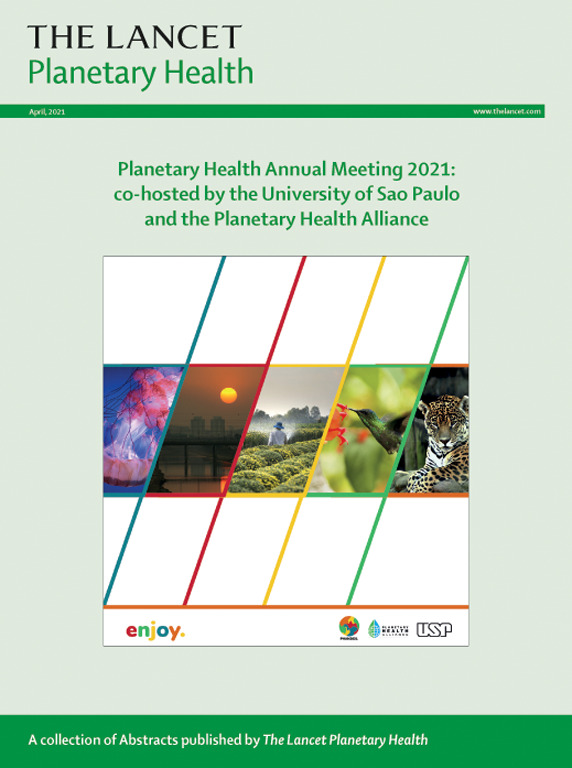Compound and cascading effects of climatic extremes on dengue outbreak risk in the Caribbean: an impact-based modelling framework with long-lag and short-lag interactions
IF 21.6
1区 医学
Q1 ENVIRONMENTAL SCIENCES
引用次数: 0
Abstract
Background
Small islands developing states in the Caribbean are exposed to increasingly frequent and intense extreme climatic events, which can exacerbate outbreaks of climate-sensitive infectious diseases. Few forecasting tools incorporate the compound and cascading effects of multiple delayed climatic indicators on disease outbreak risk. We aimed to create an impact-based modelling framework that employs interactions between climatic predictors to forecast the probability of a climate-sensitive infectious disease outbreak 3 months ahead, and to investigate the compound and cascading effects of temperature and long-lag and short-lag standardised precipitation index (SPI) on dengue outbreak risk in Barbados.
Methods
We developed a modelling framework to predict the probability of a dengue outbreak in Barbados with a 3-month lead time. We assessed the relationships between dengue incidence and interacting long-lag and short-lag hydrometeorological predictors with confirmed cases from 1999 to 2022 and a Bayesian hierarchical framework accounting for seasonal and interannual variation. With this long–short-lag interaction model, we piloted a dengue early warning system in Barbados for the International Cricket Council Men's Twenty20 World Cup in June, 2024, as a real-world prospective example.
Findings
We found that a three-way interaction between the 3-month averaged mean temperature anomaly lagged by 3 months, 6-month SPI (SPI-6) lagged by 5 months, and SPI-6 lagged by 1 month best predicted dengue outbreak risk in Barbados. Our findings showed that long-lag dry (lagged by 5 months), mid-lag hot (lagged by 3 months), and short-lag wet (lagged by 1 month) conditions led to the greatest dengue risk. During cross-validation from 2012 to 2022, the model exhibited a true positive rate (TPR) of 81% and a false positive rate (FPR) of 29%, outperforming a baseline model representing standard practice with a TPR of 68% and an FPR of 48%. For the Twenty20 World Cup, the model predicted a 95% outbreak probability due to epidemiological and climatic conditions, which was shared with the Barbados Ministry of Health and Wellness ahead of the tournament.
Interpretation
Our impact-based modelling framework with long-lag and short-lag interactions explicitly accounted for the compound and cascading effects of drought, heat, and excessively wet conditions on dengue outbreak risk in Barbados. The model is being implemented in a national dengue early warning system with ongoing monitoring and evaluation to ensure its reliability and usefulness in operational contexts. Future work could explore the applicability of this methodology to modelling or predicting climate-sensitive infectious diseases in other endemic settings.
Funding
Wellcome Trust, Horizon Europe, European Development Fund, and Royal Society.
极端气候对加勒比地区登革热暴发风险的复合和级联效应:具有长滞后和短滞后相互作用的基于影响的建模框架
背景加勒比小岛屿发展中国家面临日益频繁和强烈的极端气候事件,这可能加剧气候敏感传染病的爆发。很少有预报工具考虑到多种延迟气候指标对疾病爆发风险的复合和级联效应。我们的目标是创建一个基于影响的建模框架,利用气候预测器之间的相互作用来预测未来3个月气候敏感传染病爆发的可能性,并调查温度和长滞后和短滞后标准化降水指数(SPI)对巴巴多斯登革热爆发风险的复合和级联效应。方法我们开发了一个建模框架,以预测3个月提前期在巴巴多斯爆发登革热的可能性。我们评估了登革热发病率与1999年至2022年确诊病例的相互作用的长滞后和短滞后水文气象预测因子之间的关系,以及考虑季节和年际变化的贝叶斯分层框架。利用这个长-短滞后互动模型,我们在巴巴多斯为2024年6月的国际板球理事会男子20 / 20世界杯试验了一个登革热预警系统,作为一个现实世界的前瞻性例子。研究发现,3个月平均气温异常滞后3个月,6个月SPI (SPI-6)滞后5个月,SPI-6滞后1个月是预测巴巴多斯登革热爆发风险的最佳指标。我们的研究结果显示,长滞后干燥(滞后5个月)、中滞后炎热(滞后3个月)和短滞后潮湿(滞后1个月)导致登革热风险最大。在2012年至2022年的交叉验证中,该模型的真阳性率(TPR)为81%,假阳性率(FPR)为29%,优于代表标准实践的基线模型,其TPR为68%,FPR为48%。对于2020年世界杯,该模型预测,由于流行病学和气候条件,疫情爆发的概率为95%,并在比赛前与巴巴多斯卫生和健康部共享了这一预测。我们基于影响的建模框架具有长滞后和短滞后相互作用,明确解释了干旱、高温和过度潮湿条件对巴巴多斯登革热爆发风险的复合和级联效应。该模型正在国家登革热预警系统中实施,并进行持续监测和评价,以确保其在业务环境中的可靠性和实用性。未来的工作可以探索这种方法在其他流行环境中对气候敏感传染病建模或预测的适用性。资助惠康信托基金、地平线欧洲、欧洲发展基金和皇家学会。
本文章由计算机程序翻译,如有差异,请以英文原文为准。
求助全文
约1分钟内获得全文
求助全文
来源期刊

Lancet Planetary Health
Multiple-
CiteScore
28.40
自引率
2.30%
发文量
272
审稿时长
8 weeks
期刊介绍:
The Lancet Planetary Health is a gold Open Access journal dedicated to investigating and addressing the multifaceted determinants of healthy human civilizations and their impact on natural systems. Positioned as a key player in sustainable development, the journal covers a broad, interdisciplinary scope, encompassing areas such as poverty, nutrition, gender equity, water and sanitation, energy, economic growth, industrialization, inequality, urbanization, human consumption and production, climate change, ocean health, land use, peace, and justice.
With a commitment to publishing high-quality research, comment, and correspondence, it aims to be the leading journal for sustainable development in the face of unprecedented dangers and threats.
 求助内容:
求助内容: 应助结果提醒方式:
应助结果提醒方式:


